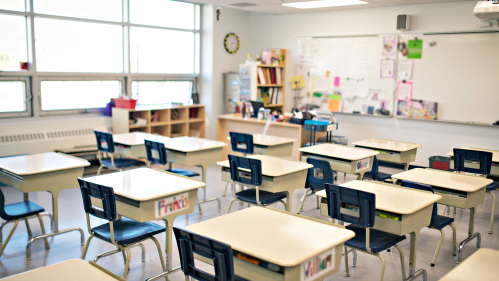Most New Jerseyans Support Fully Reopening Public Schools in Fall, Requiring Vaccinations for Healthcare Workers

About Six in Ten Support Vaccine Passports and Employer- and College-Required Vaccination
As vaccination rates increase and prospects of normal life return more than a year into the coronavirus pandemic, New Jerseyans differ on various aspects of this “new normal” and how comfortable they feel, according to the latest Rutgers-Eagleton Poll.
Almost all New Jerseyans support (63 percent “strongly,” 24 percent “somewhat”) fully reopening public schools with in-person instruction in the fall. Seven in 10 residents say they also support (54 percent “strongly,” 18 percent “somewhat”) healthcare institutions requiring all their workers to be vaccinated to remain at or return to work.
Views are more mixed on other aspects of life requiring vaccination, although support is stronger than opposition. Sixty-six percent support (46 percent “strongly,” 20 percent “somewhat”) colleges and universities requiring all of their students to be vaccinated to remain at or return to campus. Sixty-one percent of residents support (39 percent “strongly,” 22 percent “somewhat”) establishing a credential, certification or vaccine “passport” that proves immunization. Similar numbers support (35 percent “strongly,” 26 percent “somewhat”) employers requiring all of their employees to be vaccinated to remain at or return to work.
“While solid majorities either strongly or somewhat support these actions, there are stark partisan differences when it comes to requiring vaccinations in certain circumstances and establishing vaccine passports,” said Ashley Koning, an assistant research professor and director of the Eagleton Center for Public Interest Polling (ECPIP) at Rutgers University–New Brunswick. “Like with many aspects of the pandemic, Republicans are in opposition to such requirements, while Democrats are in favor, and independents lie somewhere in between. Vaccination status has also become another dividing line, with those at least one dose in much more amenable than those who have yet to receive a dose.”
A majority of New Jerseyans have been masking up all or most of the time indoors in public spaces (62 percent, 17 percent), outdoors in crowded spaces (45 percent, 16 percent), and when around people not in their household (35 percent, 21 percent). Residents say they have worn masks outdoors in uncrowded spaces to a much lesser extent (22 percent “most of the time,” 11 percent “some of the time”).
New Jersey is now one week into the mask mandate being lifted, but two-thirds of residents say they will definitely (36 percent) or probably (30 percent) keep wearing a mask; 16 percent say they will probably not continue to wear a mask, and 18 percent say they definitely will not.
“Vaccinated individuals are just as likely as unvaccinated individuals to say they will ‘definitely’ or “probably” continue to wear a mask,” Koning noted. “Unvaccinated residents are almost twice as likely as vaccinated residents, however, to say they will ‘definitely’ not wear a mask going forward.”
New Jerseyans are more comfortable with some activities than others as life returns to some kind of normal. Almost all are comfortable with outdoor dining at a restaurant (70 percent “very,” 20 percent “somewhat”) or gathering in-person with friends or family outdoors (69 percent “very,” 23 percent “somewhat”) or indoors where everyone is vaccinated (69 percent).
Similarly, residents are mostly fine with working in-person at their place of employment (64 percent “very,” 24 percent “somewhat”); shopping in a retail store (59 percent “very,” 34 percent “somewhat”); going to a performance, movie, sporting event or concert outdoors (54 percent “very,” 25 percent “somewhat”); going to a hair salon, barbershop or spa (50 percent “very,” 34 percent “somewhat”); or dining inside a restaurant (50 percent “very,” 30 percent “somewhat”).
To a slightly lesser extent, a majority of New Jerseyans are also comfortable at some level with attending an in-person gathering with friends or family indoors regardless of vaccination status (38 percent “very,” 31 percent “somewhat”); going to a performance, movie, sporting event or concert indoors (35 percent “very,” 29 percent “somewhat”); or flying in an airplane or using another form of mass transit (32 percent “very,” 29 percent “somewhat”).
Half of New Jerseyans (51 percent) say the state is moving at the right pace in lifting restrictions and reopening businesses; another 18 percent say it is moving too quickly and 31 percent say too slowly.
Residents are split on whether they feel the pandemic is over, particularly whether we are almost there or have a long way to go: 8 percent say it is completely over, 35 percent say it is mostly over, 34 percent say halfway over and 24 percent say far from over.
Results are from a statewide poll of 1,004 adults contacted by live interviewers on landlines and cell phones from May 21–29. The full sample has a margin of error of +/- 3.8 percentage points.


